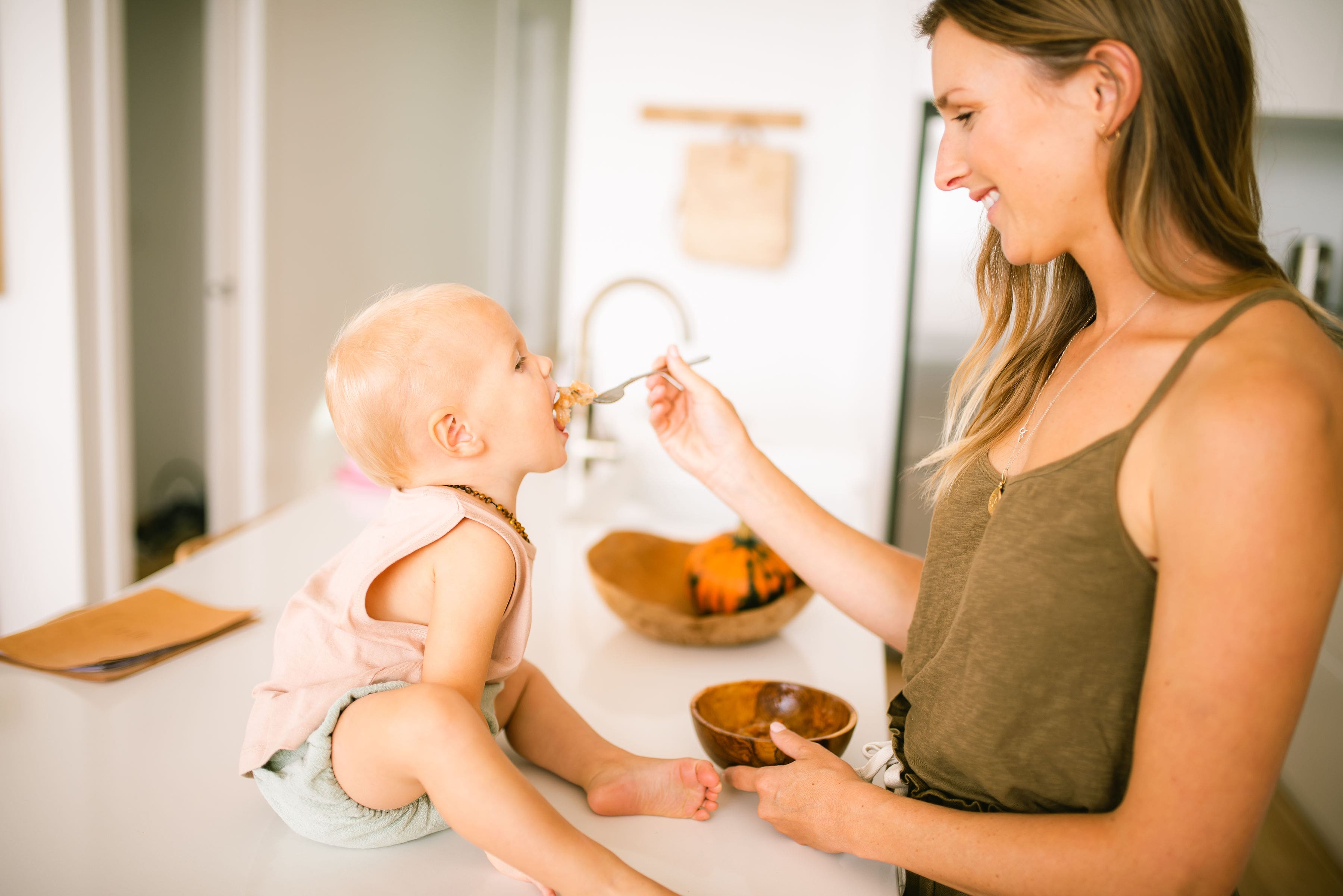
first foods with boob to food
Our friend Luka McCabe, registered nurse, midwife and nutrition consultant, shares with us her wisdom on navigating the tricky, exciting and confusing time of introducing your little one to food. Luka has founded the Instagram community and website Boob to Food, and has also recently launched her new book 'Milk to Meals' which is a wonderful guide filled with tips and recipes for you and your family centrered around nutritious and whole foods.
FIRST FOODS
by Luka McCabe
Making the transition into solids is a major milestone, and it is such an exciting and fun time! But for some, it can also be a time of confusion, intimidation and stress! There is SO much conflicting information and opinions out there about when to start, how to start and what to start with; how do you know what is the right thing to do!?
Firstly, I want to remind you, that you have kept your little one alive and thriving for the last few months, you have learnt a lot, had some wins but also made mistakes – and hey, they are still alive! Pretty robust our little ones are!
So, firstly, WHEN should they start?
The current recommendation is that infants are exclusively breastfed (or formula fed) until 6 months of age (this means no water, other beverages or food) and to start your child on solids at 6 months of age. This recommendation is supported by the World Health Organisation, the American Academy of Paediatrics, the Australian National Health and Medical Research Council, the UK Department of Health and National Health Service, and Health Canada. The guidelines were changed to 6 months of age in 2001.
This is because breastmilk or formula is considered a complete source of nutrition and contains all the nutrients that your baby requires until 6 months. After 6 months, your baby will require some extra nutrients as an addition to the nutrients found in breastmilk/formula.
However, a magic switch does not occur at 6 months that makes your baby ready, babies are all individual and will be ready at different stages. Therefore, it is encouraged to instead look for your baby meeting the developmental signs of readiness. These are signs that your baby will show that their delicate digestive systems are mature enough to properly digest food, and to eat food safely! Babies GENERALLY will meet these signs around the 6-month mark, some might meet them a bit earlier, some a bit later, but generally they are met between 5.5 months and 7 months.
The signs are:
- Being able to sit unassisted/unsupported without any aids (such as a Bumbo), with good head and neck strength, so that your baby can actively be a part of meals, moving his or her head towards the food. It is important that your baby is sitting, as their digestive system is made up of muscles that, through a contraction-like movement called peristalsis, helps the food move from their mouth to their bottom and out! When your baby has the core strength to sit on their own, this is a good indicator that the muscles of their digestive system are ready and strong enough to digest food.
- Loss of ‘tongue thrust reflex’ or ‘extrusion reflex’, which generally has gone by around 4 months of age. This reflex occurs when your baby’s lips are touched (by food/objects). Their tongue automatically (reflexively) moves forward, which will cause them to push the food out of their mouth with their tongue—often mistaken for the baby disliking a food.
- Interest and active engagement in eating.
- Has developed or is practicing a ‘pincer grasp’ and can grasp or attempt to grasp the spoon/food and bring it to their mouth. This can take a few months to master however!


So, what is the best food to start with?
There really is no ‘perfect’ first food for your baby, however what I would encourage is to start with a food that is a whole food, nutritious, soft and easy to eat and easy to digest. I also like to focus on savoury foods over sweet, as babies will tend to prefer sweet foods so getting them to enjoy savoury foods early is key! I am not a fan of the typically recommended rice cereals and baby cereals (read my thoughts on that here).
My favourite first foods for babies are:
1. Soft ripe avocado, in either finger length/shape size slices (skin removed) or mashed avocado (completely smooth, no lumps) loosened with breastmilk, water or formula.
2. Baked or steamed sweet potato or butternut pumpkin (or really any other vegetable stick) in coconut oil, again in either finger length/shape size slices (skin removed) or pureed until completely smooth and you can loosen with breastmilk, water, formula or homemade bone broth (which will further aid digestion).
3. Bone broth; you can find a recipe here which is a beautiful nourishing beverage rich in collagen which helps to seal your babies developing gut lining.
4. Once your baby has had a couple of weeks of low allergenic foods and no issues, I like to introduce egg yolk to their diet (save the egg white until around 9 months as the white contains the proteins that are linked to allergies and sensitivities). Egg yolks make a wonderful first food for babies (after the introduction of a few non allergenic foods). They contain an easily absorbable iron (heme iron) that babies start to require more of around the time solids are introduced. I always recommend pasture raised eggs as they contain the powerful fat needed for babies brains, DHA.
A couple of other tips and tricks for this age:
- While this is a fun and exciting time for your baby and yourself, remember that your baby has some significant nutritional needs at this stage that breastmilk or formula no longer completely meet; predominantly iron, zinc and omega 3/DHA. Foods such as egg yolk, liver, cod liver oil, bone marrow, soft tender meat and broths. At around 8 months fish; especially fatty fish like sardines and salmon, is a great addition to the diet. Fish is a top allergen food so should be introduced mindfully.
- Be liberal in enriching baby’s first foods with healthy saturated fats.
- Add fermented foods such as sauerkraut brine or cultured vegetables to one meal a day in very small amounts to start.
- Keep food as easy to digest as possible; this can be achieved by cooking in or pairing meals with broths and saturated fats. Offer well cooked vegetables and very ripe fruits.
- There is no right or wrong order for which foods you start with in this guide. However, I would recommend not introducing the allergen foods such as egg yolk, nut butters or tahini (sesame) until your baby has had a few successful introductions to low allergenic foods with no issues.
- Breastmilk or formula should still be baby’s main source of nutrition (until 12 months) and first foods shouldn’t replace these milk feeds, but instead should be offered in between normal milk feed times.
- Mid-morning is a great time to introduce foods to your baby, before they are overtired, over stimulated, too hungry or too full!
- Remember that your baby may play with their food at this stage and may only consume very small amounts for the first month or two. This is ok, and all a part of learning. Your job is to offer your baby these nutrient dense foods. Let your baby be the guide of how much he or she wants to eat.
Luka xx
Thank you so much for sharing your wonderful knowledge with us Luka! We hope this helps you navigate those tricky early days of introducing little ones to solids! xx Nb





